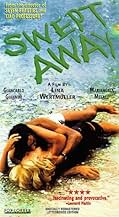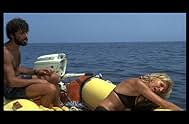CALIFICACIÓN DE IMDb
7.5/10
7.2 k
TU CALIFICACIÓN
Un viaje por el mar Mediterráneo se convierte en un viaje al descubrimiento de cómo los marcos sociales de ricos y pobres son delicados y temporales.Un viaje por el mar Mediterráneo se convierte en un viaje al descubrimiento de cómo los marcos sociales de ricos y pobres son delicados y temporales.Un viaje por el mar Mediterráneo se convierte en un viaje al descubrimiento de cómo los marcos sociales de ricos y pobres son delicados y temporales.
- Premios
- 4 premios ganados y 4 nominaciones en total
Opiniones destacadas
Back in the 1970's Lina Wertmuller was an art-house superstar. But more importantly, she was a first class original, bursting with a fresh, exciting vision.
Now, here's a lively storyline: a rich, racist, reactionary female- a right wing, fascist mind in a knuckle-biting, voluptuous body -is stranded on a mid-sea desert isle with a poverty-stricken, chauvinistic, Communist male- a left-leaning propagandist in a scrawny masculine body. "Make nice" they don't. Well, not right off the bat. Not before much nasty invective and grievous bodily assault take place. But then afterward....ahh, afterward.
SWEPT AWAY, though a foreign film, is in the manic, irreverent, well-timed tradition of Hollywood screwball comedies like THE AWFUL TRUTH(1937), MIDNIGHT(1939), THE LADY EVE(1941), and most emphatically, HIS GIRL FRIDAY(1940)- only with a shipload more profane repartee, orgiastic lust, and bone-crunching physicality than was ever permissible or desirable in those older classics. Throwing all vestiges of caution to the four winds, Wertmuller really surprises the viewer with her take on the battle of the genders strained through a volcanic political dialectic.
Upon its initial release many in the audience demurred strongly (and still do) as the male's dominance slipped into outright brutality. Certainly, Wertmuller can be accused of going too far, but never of boring us. Giancarlo Giannini and Mariangelo Melato are absolutely letter perfect: sulking, teasing, attacking, retreating, seducing, rampaging, abandoning. Their director spurs them through an emotional and physical gauntlet and they meet each dramatic challenge with winning artistry. You may feel wrung out by film's end. Or enraged. Or both. But you'll have quite a time.
Now, here's a lively storyline: a rich, racist, reactionary female- a right wing, fascist mind in a knuckle-biting, voluptuous body -is stranded on a mid-sea desert isle with a poverty-stricken, chauvinistic, Communist male- a left-leaning propagandist in a scrawny masculine body. "Make nice" they don't. Well, not right off the bat. Not before much nasty invective and grievous bodily assault take place. But then afterward....ahh, afterward.
SWEPT AWAY, though a foreign film, is in the manic, irreverent, well-timed tradition of Hollywood screwball comedies like THE AWFUL TRUTH(1937), MIDNIGHT(1939), THE LADY EVE(1941), and most emphatically, HIS GIRL FRIDAY(1940)- only with a shipload more profane repartee, orgiastic lust, and bone-crunching physicality than was ever permissible or desirable in those older classics. Throwing all vestiges of caution to the four winds, Wertmuller really surprises the viewer with her take on the battle of the genders strained through a volcanic political dialectic.
Upon its initial release many in the audience demurred strongly (and still do) as the male's dominance slipped into outright brutality. Certainly, Wertmuller can be accused of going too far, but never of boring us. Giancarlo Giannini and Mariangelo Melato are absolutely letter perfect: sulking, teasing, attacking, retreating, seducing, rampaging, abandoning. Their director spurs them through an emotional and physical gauntlet and they meet each dramatic challenge with winning artistry. You may feel wrung out by film's end. Or enraged. Or both. But you'll have quite a time.
Swept Away (1974)
**** (out of 4)
Rich woman Raffaella Lanzetti (Mariangela Melato) and her servant Gennarino Carunchio (Giancarlo Giannini) end up being taken away from their boat as the current sweeps them away and onto a deserted island. Now that the tables are turned and her money isn't going to save her, Gennarino plans to teach the woman a lesson about life. Lina Wertmuller's SWEPT AWAY has been called a masterpiece by many, a evil picture by some and there are certainly some that fall somewhere in between. I think the reason there are so many mixed reviews of this film is that it's so hard to fully put your hands on it. I mean, a hundred different people could attend a screening of this film and then afterwards each of them would see something different. Is it a drama? It is a political message about living conditions between the rich and poor? Is it some sort of dark comedy where the poor man gets his day in the sun? SWEPT AWAY is a film I really loved watches even if parts of it certainly rubbed me the wrong way. The opening twenty-minutes or so clearly set up that this rich woman is rather heartless, cruel and uncaring about anyone other than herself. When she gets lost at sea you're happy to see her get a dose of reality but at the same time I can't say I enjoyed how she got it. There were times where the man physically abuses her and I must admit that this didn't make me care for him any or cheer for him to "teach" the rich woman. Yet, the film takes these ugly moments and does stuff with them that most films wouldn't dare try, nevermind actually making them work. Another rather remarkable thing is how much you can believe what you're seeing. I'm not going to ruin what actually happens but director Wertmuller really makes you believe it from start to finish and talk about the perfect ending. The film contains some very harsh language and some ugly violence but in its own pay these scenes are rather poetic. Another major plus is that both Melato and Giannini turn in two of the greatest performances you're going to see. Both of them were simply terrific in their roles and even when the tables are turned, both of them are believable and really sell the fire and passion of the story. SWEPT AWAY is a very unique film that's quite unlike any other including the countless imitations that have been released. The film manages to work on so many levels and it's greatness is also what many might see as ugliness.
**** (out of 4)
Rich woman Raffaella Lanzetti (Mariangela Melato) and her servant Gennarino Carunchio (Giancarlo Giannini) end up being taken away from their boat as the current sweeps them away and onto a deserted island. Now that the tables are turned and her money isn't going to save her, Gennarino plans to teach the woman a lesson about life. Lina Wertmuller's SWEPT AWAY has been called a masterpiece by many, a evil picture by some and there are certainly some that fall somewhere in between. I think the reason there are so many mixed reviews of this film is that it's so hard to fully put your hands on it. I mean, a hundred different people could attend a screening of this film and then afterwards each of them would see something different. Is it a drama? It is a political message about living conditions between the rich and poor? Is it some sort of dark comedy where the poor man gets his day in the sun? SWEPT AWAY is a film I really loved watches even if parts of it certainly rubbed me the wrong way. The opening twenty-minutes or so clearly set up that this rich woman is rather heartless, cruel and uncaring about anyone other than herself. When she gets lost at sea you're happy to see her get a dose of reality but at the same time I can't say I enjoyed how she got it. There were times where the man physically abuses her and I must admit that this didn't make me care for him any or cheer for him to "teach" the rich woman. Yet, the film takes these ugly moments and does stuff with them that most films wouldn't dare try, nevermind actually making them work. Another rather remarkable thing is how much you can believe what you're seeing. I'm not going to ruin what actually happens but director Wertmuller really makes you believe it from start to finish and talk about the perfect ending. The film contains some very harsh language and some ugly violence but in its own pay these scenes are rather poetic. Another major plus is that both Melato and Giannini turn in two of the greatest performances you're going to see. Both of them were simply terrific in their roles and even when the tables are turned, both of them are believable and really sell the fire and passion of the story. SWEPT AWAY is a very unique film that's quite unlike any other including the countless imitations that have been released. The film manages to work on so many levels and it's greatness is also what many might see as ugliness.
What marvelous Italian sensibility! Italians have to be muted for drama, but give them comedy and they soar, it's who they are, who we are in general down South and all over the Mediterranean - boisterous, frivolous, yelling past each other out of some need to stay afloat, lest the silence bogs us down.
The allegory is of course as obvious as the characters, a shrill rich wife and a grumbling sailor, a communist we're told, on board her yacht during a cruise get stranded in a deserted island. Of course the dynamics shift - we see how easy and quick it is for him to become a tyrant now that he has the upper hand, how degrading for her to be ordered about. But then sex enters the picture and that changes everything; she's beaten around, almost raped and comes to love the submission.
As thin as the politics may be, so much more subversive when it becomes sexual. Rape fantasies are common in men and women alike, no reason to hide, and nothing peculiar about it - sex is after all in a primal way about the swap of power. But here just as about the fantasy is about to be consummated, at the peak of sexual paroxysm, this is the moment the filmmaker chose to have the man pull back and be revealed a delusional fool - she must cherish him as her god and so on.
The question that looms, a deep deep one, is was it the island? Or is it civilization that obscures? Which of the two shows their true self? Eventually they bond as lovers, but that is based on everything else we've seen. Do the limits imposed by being seen and known in public lead into delusions of self? Or does uninhibited freedom? Was it true love or was it a simple desire that found no limits to run up against? Who's to make all these impositions of truth anyway?
And we have to counterpoint all this against the richness of how they hold themselves in each other's eyes, some of the most expressive eyes in film - it's perfectly cast anyway, but the eyeplay between the two is marvelous, starting from that moment they share on the deck one night.
So this is fascinating stuff, about limits of self, about a slippery passion and having no logical truth that can explain beyond it, the only thing it asks is that you don't be moral about it. I can only imagine it better in Pasolini's hands, this lover of textures and breezes of air.
The allegory is of course as obvious as the characters, a shrill rich wife and a grumbling sailor, a communist we're told, on board her yacht during a cruise get stranded in a deserted island. Of course the dynamics shift - we see how easy and quick it is for him to become a tyrant now that he has the upper hand, how degrading for her to be ordered about. But then sex enters the picture and that changes everything; she's beaten around, almost raped and comes to love the submission.
As thin as the politics may be, so much more subversive when it becomes sexual. Rape fantasies are common in men and women alike, no reason to hide, and nothing peculiar about it - sex is after all in a primal way about the swap of power. But here just as about the fantasy is about to be consummated, at the peak of sexual paroxysm, this is the moment the filmmaker chose to have the man pull back and be revealed a delusional fool - she must cherish him as her god and so on.
The question that looms, a deep deep one, is was it the island? Or is it civilization that obscures? Which of the two shows their true self? Eventually they bond as lovers, but that is based on everything else we've seen. Do the limits imposed by being seen and known in public lead into delusions of self? Or does uninhibited freedom? Was it true love or was it a simple desire that found no limits to run up against? Who's to make all these impositions of truth anyway?
And we have to counterpoint all this against the richness of how they hold themselves in each other's eyes, some of the most expressive eyes in film - it's perfectly cast anyway, but the eyeplay between the two is marvelous, starting from that moment they share on the deck one night.
So this is fascinating stuff, about limits of self, about a slippery passion and having no logical truth that can explain beyond it, the only thing it asks is that you don't be moral about it. I can only imagine it better in Pasolini's hands, this lover of textures and breezes of air.
A trip into the Mediterranean sea becomes a trip into the discovery of how society's frameworks of the rich and poor are delicate and temporary.
In his review in the Chicago Sun-Times, American film critic Roger Ebert gave the film four stars, his highest rating. Ebert wrote that the film "resists the director's most determined attempts to make it a fable about the bourgeoisie and the proletariat, and persists in being about a man and a woman. On that level, it's a great success." I'm on board with Ebert. I think this film was exceptional. Emotionally, it was raw, and I have to praise the performers and the director for the intensity. How you get a love story out of deep economic and political hatred, I don't know, but they pull it off. And despite the violence and abuse, there is something deeper here. Really a great film with something powerful to say.
In his review in the Chicago Sun-Times, American film critic Roger Ebert gave the film four stars, his highest rating. Ebert wrote that the film "resists the director's most determined attempts to make it a fable about the bourgeoisie and the proletariat, and persists in being about a man and a woman. On that level, it's a great success." I'm on board with Ebert. I think this film was exceptional. Emotionally, it was raw, and I have to praise the performers and the director for the intensity. How you get a love story out of deep economic and political hatred, I don't know, but they pull it off. And despite the violence and abuse, there is something deeper here. Really a great film with something powerful to say.
A film that's exceedingly difficult to pin down. It would be easy to dismiss it, but it's just as easy to be startled and amazed by it. The story's simple enough: a shaggy, dark-skinned man (played by Giancarlo Gianni) works under the thumb of the bourgoisie on a hired yacht. He despises them, and they despise him. One of these rich people is particularly annoying, a blonde woman (Mariangelo Melato), who spends her days incessantly bitching, spouting capitalist slogans, and putting down the servant class. These two characters, not surprisingly, end up together on a dinghy whose motor has broken. She never shuts up, he stares at her murderously. They eventually land on a deserted island, where he refuses to help her whatsoever. She eventually has to submit to whatever abuses he chooses to dish out. Yes, that does include physical and eventually a near-rape, which will certainly disgust and upset a lot of the film's audience. The film can actually be sort of perverse. I'm sure many have marvelled that, with some of the film's crueller scenes, the film was directed by a woman. It is actually, in its way, nearly as perverse at some times as The Night Porter, directed in the very same year in Italy, also by a woman. That film's merits are more dubious than Swept Away's, however. The film is unexpectedly hilarious, at least for the first forty-five minutes or so. When the abuse starts, the film begins to shift to a social issues picture. Class issues are important, as well as racial issues (which kind of amount to the same thing). I didn't mind seeing the woman verbally abused - she spent the first forty-five minutes doing the same to the guy. The smackings she receives were hard for even me to take, however. The politics are nevertheless exceedingly interesting. The film has some very good material on the social constructions of class. After this section of the film, the story shifts to erotica, and it is very erotic at times. In this section, the film is a direct descendent of Bertolucci's Last Tango in Paris (as was The Night Porter, incidentally). After that, the film shifts once again to romantic melodrama, as the two are rescued. The man makes the decision to signal a yacht that he sees in the distance simply because he wants to test the deep love that the woman swears by. These shifts in narrative can be clearly felt, like upshifting in a manual transmission vehicle, but it works rather well. I was always right with the film with its emotions (although it took me a good twenty minutes to get into the film). I ended up rather loving it, despite its flaws. Now I actually want to see the Madonna version to see how bad that hack Guy Ritchie screwed it up. At one point in the film the man tells the woman that she looks like the Madonna. Pretty funny, no? 9/10.
¿Sabías que…?
- TriviaWas chosen by Premiere magazine as one of the "100 Movies That Shook the World" in the October 1998 issue. The list ranked the most "daring movies ever made."
- ErroresWhen the dinghy stalls out, Rafaella complains about not having paddles. Minutes later in the film, Rafaella and Gennarino both have paddles in their hands.
- Citas
Gennarino Carunchio: One bitch up there, and another down here, and my friend the sea turned traitor!
- ConexionesFeatured in Sola me ne vo... (2013)
Selecciones populares
Inicia sesión para calificar y agrega a la lista de videos para obtener recomendaciones personalizadas
- How long is Swept Away?Con tecnología de Alexa
Detalles
Taquilla
- Total en EE. UU. y Canadá
- USD 33,698
- Fin de semana de estreno en EE. UU. y Canadá
- USD 1,011
- 16 abr 2017
- Total a nivel mundial
- USD 33,698
Contribuir a esta página
Sugiere una edición o agrega el contenido que falta

Principales brechas de datos
What is the Spanish language plot outline for Travolti da un insolito destino nell'azzurro mare d'agosto (1974)?
Responda


























